CVG Strategy, a trusted name in ITAR and Export Compliance consulting and training announces its current ITAR Training Schedule. CVG Strategy has been providing ITAR compliance training programs now for over a decade. Our classes are informative, engaging, and provide time for your questions.
CVG Strategy ITAR Compliance Training Webinars, presented by CVG Strategy’s Senior ITAR Training Manager, Kevin Gholston, provide comprehensive training in all sectors of export compliance including International Traffic in Arms Regulations (ITAR) and Export Administration Regulations (EAR).
Regular training is essential for companies dealing in defense articles or services and is required by both the Department of State Directorate of Defense Trade Controls (DDTC) and the Bureau of Industry and Security (BIS).
ITAR Training Schedule for Fall 2022
August 23, 2022 September 13, 2022 October 11, 2022
Export Compliance Integration into Quality Management Principles
ISO 9001:2015 quality management system (QMS) requirements include the consideration of external factors such as ITAR regulatory requirements. Organizations that need to fulfill these requirements need to be aware of that auditors may be asking about ITAR/export compliance and how it affects their organization. CVG Strategy can provide implementation, training and support for clients needing an export compliance program.
“We’ve had great success in helping companies with ITAR training and export compliance consulting,” said Cindy V. Gholston, President of CVG Strategy. “With the enhanced focus on external regulations in the new ISO 9001:2015 and AS9100D it’s important to incorporate export compliance as part of their QMS.”
Course Description
CVG Strategy’s ITAR and export compliance training conforms with the guidelines from the Department of State’s Guidelines and the Department of Commerce’s Elements. CVG Strategy’s ITAR Training Program keeps compliance professionals up to date on export control and export regulation developments. This ensures that your company can avoid costly violations.
Course topics include:
- The legal basis for ITAR and the USML (United States Munitions List)
- EAR and CCL (Commerce Control List) as administered by the BIS
- Technical data controls
- Filing for Export licenses
- Enforcement of export compliance regulations and penalties
- How to engage in brokering activities
- ITAR and EAR classification activities
Our Export Compliance Training Goals
Export compliance is an extremely complex subject. While it is, without doubt, a subject of extreme importance, most training sessions available to the public are dull. CVG Strategy encourages class participation and because we limit the size of our classes you have ample opportunity to get clarification on any questions you might have. As a result students have a better retention of important information.
Our training provides an overview of the ITAR and EAR so that students can confidently approach the many pages of regulations they need to access in their daily functions as members of an export compliance team.
Export Compliance Education is Important
Export Compliance regulations are continually being modified to protect U.S. national security and foreign policy needs. Failure to comply with these regulations can result in administrative and/or criminal penalties. These penalties include fines, debarment from export activities, and even imprisonment. Additionally, incidents that require enforcement can damage the reputation and credibility of your organization.
Enforcement agencies are increasing their efforts to prosecute organizations that violate export violations. They are also increasing penalties and publicizing actions taken against companies found to be guilty of infractions. This applies not only to the ITAR and EAR regulations but to denied parties and antiboycott regulations as well.
When evaluating an export compliance program, agencies will access the level and regularity of training provided to members of that organization. Proper training allows team members to correctly perform export control classifications, identify foreign nationals, and determine which transactions require a license. Check our ITAR Training Schedule regularly to keep your export team up to date.
About CVG Strategy
CVG Strategy is a certified 8(a) minority woman-owned consultancy located on the Space Coast of Florida, just south of Cape Canaveral. Areas of focus include ITAR, Product Qualification Testing, Business Operations and ISO 9001:2015 training and consulting services.
CVG Strategy provides export consultant services, and online answers to your ITAR questions. We also offer a wide array of signs, badges, and accessories on our ITAR Store to help keep your facility ITAR compliant.







